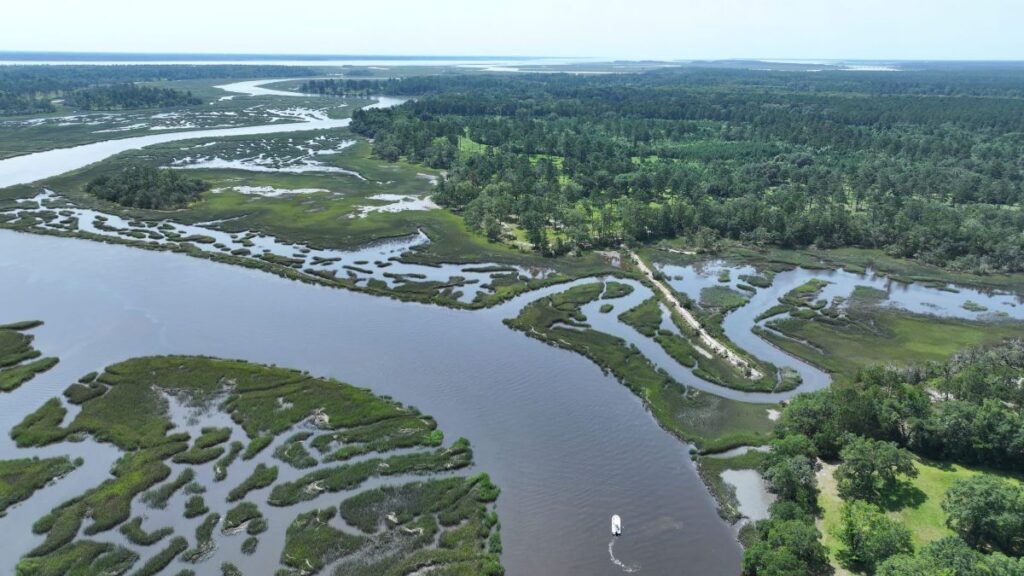By Scott Graber
The Island News
It is Thursday, Sept. 18, and I’m sitting in a wood-paneled room in Ridgeland, S.C. It is 8 p.m., and most of the 35 other people in this small, jammed-packed room are jubilant; happy because the Ridgeland Town Council has just voted, 4-1, to reject the proposed annexation, proposed rezoning and proposed development agreement presented by Tickton Hall Investments, LLC; Euhaw Holdings, LLC; Tickton Hall Holdings LLC; and Pepper Hall LLC.
For nearly three years, developers and their lawyers have been trying to convince the Town of Ridgeland to annex 1,520 acres that lie to the East of Highway 462, and to the South and West of Euhaw Creek. This tract is mostly undeveloped and lies about 8 miles away from the Town of Ridgeland proper.
This acreage, once a part of Chelsea Plantation, was slated for 2,000 new homes and 250,000 square feet of commercial development. But from the beginning, there has been opposition to these plans.
Earlier tonight, about 85 people, many wearing blue T-shirts broadcasting their opposition, streamed into the rooms and hallways of Town Hall intent on being seen and heard. Some of these folks would not find a seat in Council’s paneled, folding-chair-filled chambers and were relegated to other parts of the small brick building.
Of the attendees, 16 spoke to Council about wastewater effluent, overhead storage tanks, environmental degradation, traffic congestion and the ultimate costs of this project to the Town of Ridgeland.
Among those residents speaking against the annexation were Debbie Cooler, Richard Dean, John Allen and Smitty Cooler. There were also speakers representing conservation organizations like the Coastal Conservation League (Grant McClure) and the Port Royal Sound Foundation (Courtney Kimmel) who presented environmental concerns. There were business owners like Barry Malphrus; and there was Dean Moss, who was once the General Manager of the Beaufort-Jasper Water and Sewer Authority (BJWSA).
Moss, who is now associated with the nearby Port Royal Sound Foundation, told Council he had worries about sewage-treatment effluent, overhead storage and the fact that wastewater might be treated by a private entity.
Moss told Council that when there were problems with this system, residents would call the Town of Ridgeland looking for a remedy. He said he didn’t know of any other private utilities that operated within a municipality in this part of South Carolina. He said he did not believe that the State of South Carolina would grant such a utility a permit for discharge into the Port Royal Sound.
Moss also told Council that an overhead storage tank would be needed to maintain water pressure in this development. He said that a similar tank cost BJWSA $10 million dollars.
After the blue shirt-wearing speakers had spoken, including the applicant by and through their lawyer, Barry Johnson, Mayor Joseph (Joey) Malphrus made a motion to deny the annexation, the rezoning and the proposed development agreement. His motion got a second from Councilwoman Libby Malphrus.
Councilwoman Malphrus began her remarks by saying that the development was inconsistent with the Town’s Comprehensive Plan. Furthermore, the development would be a “financial burden” for at least the first five years and, finally, “We don’t want to become another Bluffton.”
Councilman Bill Fishburne responded by saying the petition presented earlier in the evening was flawed and the remarks made by those speakers contained “many inaccuracies.” He said the development met the criteria set out by the Town’s Comprehensive Plan and cited the Town’s agreement with Good Hope Plantation.
Then Fishburne turned to the audience and said, “After this (hearing) many of you won’t come back.” Then he said the Town had many other serious problems, citing a recent murder, again asking “Where are you most of the time?”
Dennis Averkin, the Town’s Administrator, entered the fray saying there was no plan for treating the wastewater effluent and “we don’t know if the DES (Department of Environmental Sciences) would approve.”
Finally Mayor Malphrus said he came to this project with an open mind but now “there were too many uncertainties.”
Thereafter the Mayor called for a vote and in short order the annexation, zoning change and development agreement were voted on and each, in turn, was defeated by a 4-1 vote.
During the hearing, attorney Lane Morrison spoke on behalf of his friend, Bob Phipps, who had grown up on Chelsea Plantation. In the course of Morrison’s remarks he mentioned that the owners of a neighboring tract, Bolan Hall Plantation, were considering a conservation easement.
If an easement was put into place at Bolan Hall, it would protect another 102 acres in addition to the 2,700 acres purchased by the Nature Conservancy earlier this year.
Scott Graber is a lawyer, novelist, veteran columnist and longtime resident of Port Royal. He can be reached at cscottgraber@gmail.com.

